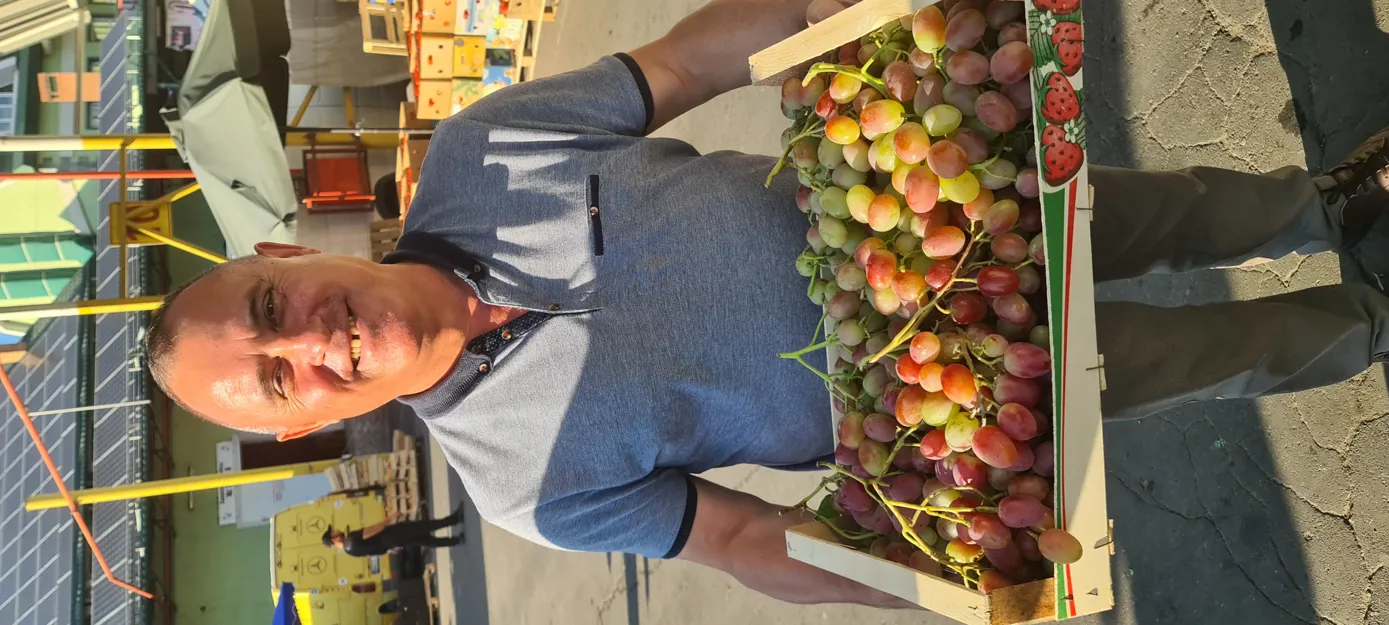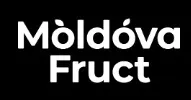The Fruit Growers and Exporters Association of Moldova, also known as Moldova Fruct, is that country's largest organization serving the fruit sector's growers, processors, exporters, and service providers. In this fifth part of our special, CEO Iurie Fala tells us about the history, operation, goals, and achievements of this institution dedicated to the apple, apricot, cherry, peach, pear, plum, and grape sectors.
Director Iurie Fala poses at Moldova grapes
This association offers its members a wide range of services, including advocacy, training and technical assistance, market diversification, and export promotion, via, among other things, international trade fairs. This non-commercial, non-governmental, non-profit organization brings its "Moldova taste makes the difference" label to international trade shows like Fruit Logistica in Berlin, Fruit Attraction in Madrid, and World of Perishables in the United Arab Emirates. This international component is vital because, while Moldova has traditionally been a large fruit producer, its local market is tiny. The main export markets are Russia - at least, until recently - the EU, and, increasingly, countries in the Middle East and Asia.
Five growers
"Moldova Fruct was founded in 2006," begins Iurie, "when, after the first Russian embargo, five growers realized that cooperation was essential to solving mutual problems through things like lobbying, introducing new cultivation and post-harvest technologies, targeted marketing, and entering new markets. Over the years, these have remained the core tasks of the organization, which is a WAPA and Freshfel affiliate. By now, the association has 180 members, 50 of whom are GlobaGAP certified. Together, they have 20,000 hectares of orchards and grow about 200,000 tons of fruit annually."
Being highly fragmented, a legacy of the past
Iurie says that at the Soviet Era's end, Moldova had 400,000 hectares of horticulture with which to supply the Soviet market with mainly fruits and tomatoes. "We were the Soviet Union's fruit barn and used to harvest a million tons of apples. After all, our climate is excellent for horticulture, and our soil is very fertile. After the U.S.S.R collapsed, cultivation fell into private companies' hands."
There are mainly Perfect sorting lines and Burg box tippers at packing stations everywhere
"Until last year, they continued to send most export apples, as much as 95%, to Russia, though total production has halved since the 1980s. Russia was a consolidated, easy market. Our growers have many contacts there, and almost all speak Russian. Plus, we could sell all our apples, from extra quality to Class II, there. Also, until recently, we shipped about half our export grapes and plums to Russia," continues Iurie.
Moldova's farming and trade sectors have always been highly fragmented, something the uncomplicated Russian market partly maintained. "We didn't have to work together to supply big European supermarkets, for example. But with the sanctions, that's slowly changing. There have been three Russian embargoes, which, although they always had political reasons, were imposed on so-called phytosanitary grounds. The first was in 2004 when the Moldovan fruit sector was still underdeveloped." The second came into effect in July 2014, four months after Russia's annexation of Crimea and not coincidentally after Moldova and the EU signed a trade agreement.
Second embargo was the tipping point
"Our sector was far better prepared for the most recent closure of the Russian market to our products. In 2014, there were only two or three packing facilities with sorting lines in the whole country; now, we have 16. After the second embargo, Moldova Fruct started to shift up a gear and managed to gain government grants to modernize our orchards and cultivation and processing facilities. Our sorting lines come from Italy, the Netherlands, Germany, and Poland. It's advantageous that our sector is only now developing; we can immediately benefit from the vast technological advances of recent years in horticulture. Plus, we can avoid the many mistakes companies in other countries made during their learning and development process," Iurie explains.
These days, the sector, thanks partly to Moldova Fruct's lobbying, has established over 10,000 hectares of super intensive, primarily apple orchards. It has also improved quality standards through technological advances in cultivation and post-harvest infrastructure. "Lobbying is an important part of what we do. Now we're hoping for more money to promote our products in foreign markets."
Moldova has many modern farms
Tough European apple market
The association hopes to make the most of it now that Moldova's apple and plum export quotas to the EU have temporarily doubled. All the more pity that, due to the drought, this year's harvest is smaller. "The apple quota rose from 40,000 to 80,000 tons. Last season, because almost all our exports were directed to Russia, we only sent 8,000 tons. This year, that important market is no more, and we should definitely be able to increase that quantity, but we shouldn't expect miracles. Competition is very fierce in the European market," Fala says.
"The European Union has 27 member states, and almost every one of those countries has its own apple crop and emphases regarding consumer preferences. We have to research that carefully when making our export plans. We, obviously, can't send, say, apples somewhere like Poland, which is, itself, a major apple producer and exporter. The German market isn't as accessible as it seems at first glance, either, because it gets plenty of Polish, Italian, Dutch, Belgian, and even Turkish apples, among others."
Grapes mainly to Eastern Europe
The CEO thinks plums will have an easier time reaching the new 40.000 (15.000 + 25.000) ton quota. Especially since Stanley plums, whose exports to Germany began in 2017, are now very popular in German-speaking countries. "We'll come close for grapes and cherries, too. We may now export 58,000 (20,000 + 38,000) tons and 3,000 (1,500 + 1,500) tons of those respectively."
 Iurie displays a crate of local grapes at the Chișinău wholesale market
Iurie displays a crate of local grapes at the Chișinău wholesale market
The Moldovan grape crop still has the disadvantage that most of the grapes harvested are seeded. "We'll have to innovate our varieties, because Western Europeans prefer seedless varieties. We could, perhaps, overcome that problem to some extent by doing more promotions and emphasizing our grapes' quality, flavor, and healthy properties. Still, I suspect, with grapes, we should rather concentrate on the Eastern European countries. They're already fairly familiar with our products, and this year, we certainly have no complaints about our grape crop's quality and yield."
Moldova Fruct's current strategy is, however, not purely focused on the European market. Diversification is the name of the game. "We mustn't make the mistake we made in the past: putting all our eggs into only one basket. Growers can, by all means, consider Europe, but not exclusively. We're also looking at the Middle East, Asia, and North Africa. In partnership with our government, we're trying to negotiate phytosanitary protocols and break down tariff barriers in various destination markets such as Egypt, India, and Vietnam. We have our fingers in many pies, and since each market has its preference, our orchards include many varieties. Our apple growers send 80% Galas to the Middle East and Goldens, Granny Smiths, and Red Chiefs elsewhere. As an association, we're always keeping our growers and exporters up to date about the different market trends."
Inflation means narrow margins
Current exports are hobbled, however, because inflation and, thus, higher cultivation, storage, and transportation costs - which Moldova has not escaped - are not mitigated by a weakened Moldovan Ieu (the country's currency) against the euro or dollar. Inflation means those increased costs can, unfortunately, not yet fully pass on to shoppers, and wages in Moldova, too, are expected to rise gradually. In the future, then, it is inevitable that digitalization and robotization will begin appearing on this country's farms.
The taste of the Moldova grape is sublime, though the variety contains a seed
"And, ultimately, you'll need only two workers per orchard: a person and a dog. The person's job will be to feed the dog, and the dog must make sure the person doesn't touch the equipment," Iurie jokes. "All jokes aside, the whole chain, from grower to logistics company to retailer, will have to ensure each link gets its share of the profits; otherwise, the chain will break. And growers are always the weakest link. This crisis has already bankrupted many a-grower. Let's also not forget that cultivation costs will rise if the European Union keeps blacklisting crop protection agents. Then we'll have to resort to pricier alternatives," he concludes.
Virtual tour of 22 cultivation companies
Moldova Fruct's website offers visitors a visual tour of 22 companies via beautiful photos and a short two-minute video of each one's orchards, storage, and sorting facilities. There is also concise information about the area, volumes, and varieties grown, and you can find each company on the map of Moldova. Interested importers can even select companies based on the varieties grown. We counted, for example, five pear varieties; for plums, it was 27, and for apples, no less than 39.
For more information:
Iurie Fala (CEO)
Moldova Fruct
102 Mitropolit Dosoftei str.
2012 Chisinau (Moldavië)
Tel: +373 22 22 30 05
Mob: +373 693 66 424
info@moldavafruct.md
ifala@moldovafruct.md
www.moldovafruct.md
More articles about Moldova:
- Support the Moldavian fruit trade
- "We're not resting on our laurels now that the Russian market's closed for our apples"
- "For the first time ever, our company is turning its gaze on the EU market"
- "We began exporting to the Middle East this spring"
- "After the second embargo in 2014, the fruit sector began shifting up a gear"
- "Losing sales despite unparalleled taste"
- "A hydro cooler would open many doors for us on the international market"
